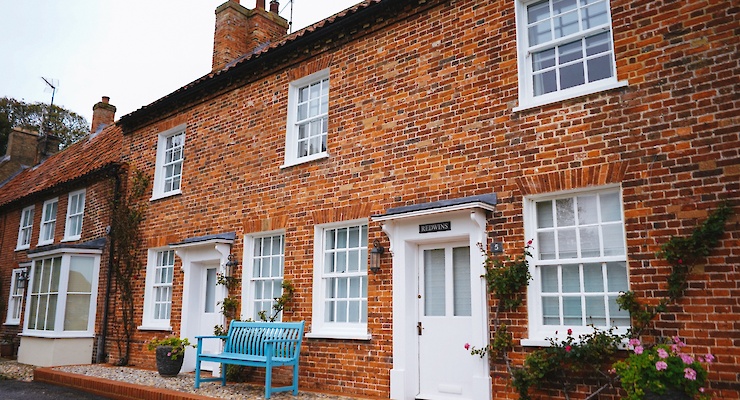


Head of Content

Mortgage Advisor & Director
When Your Mortgage Valuation is Lower Than Your Offer

Navigating the property market can be a daunting experience, especially when faced with the challenge of a down valuation.
A down valuation occurs when a mortgage lender's appraisal of a property is lower than the agreed-upon sale price, which can disrupt your plans to buy or sell a home. In this article, we will delve into the causes and impacts of down valuations, as well as provide strategies for overcoming them. By the end, you'll have a better understanding of how to navigate the complexities of the property market and achieve a successful sale or purchase.
If you're in need of personalised mortgage advice, our team is here to help.
With access to the entire UK lending market, we can provide tailored solutions that meet your specific needs and financial goals. Whether you're a first-time buyer, looking to remortgage, or seeking buy-to-let options, our experts can guide you through the process and help you find the best mortgage deal available.
Contact us today to discuss your requirements and take the first step towards securing the right mortgage for you.
Short Summary
- Understanding mortgage valuations can help you in the home buying process.
- Common reasons for down valuations include cautious lenders, economic uncertainties, and the property itself.
- Strategies to address a down valuation involve renegotiating the sale price, exploring alternative mortgage lenders, and challenging the valuation.
Understanding Mortgage Valuations and Down Valuations
Mortgage valuations and down valuations play a crucial role in the home-buying process. Here’s what you need to know:
- A mortgage valuation is used by lenders to determine the worth of a property for a mortgage.
- A down valuation arises when the surveyor’s valuation comes in lower than the agreed sale price.
- This can create significant challenges for both buyers and sellers, as it may hinder the buyer’s ability to secure a mortgage or even lead to the collapse of a sale.
It’s essential to understand the implications of down valuations and how they can affect the property market.
Down valuations (without a reduced sale price) mean a reduction in the buyer's equity, potentially placing them in a higher loan-to-value bracket, which could limit their choice of mortgage and lenders while possibly increasing interest rates. It may even result in the sale falling through.
With such high stakes at play, it’s necessary to explore common reasons for down valuations and the strategies available to address them.
Common Reasons for Down Valuations
Property Condition
Issues with the property's structure, maintenance, or other factors can result in a lower valuation.
This could include issues like damp, structural damage, or disrepair. It is important for sellers to address any maintenance or repair needs before putting the property on the market to avoid potential down valuations.
Cautious Lenders
Fluctuations in the property market can lead to cautious lenders who may undervalue properties to mitigate potential losses.
During market downturns or instability, lenders may be more conservative in their valuations, leading to down valuations. Buyers and sellers can address this issue by exploring alternative financing options or renegotiating the sale price.
Economic Uncertainties
Economic uncertainties, such as the COVID-19 pandemic or Brexit, can significantly impact property valuations.
During uncertain times, surveyors may undervalue properties to protect themselves from potential liability if the market experiences a decline. Rising interest rates and market fluctuations can also influence surveyor values. Buyers and sellers can mitigate down valuations by setting realistic asking prices, conducting comprehensive market research, and being prepared for mortgage valuation surveys.
Local Market Conditions
Local market conditions, including supply and demand, can affect property valuations.
Appraisers consider recent sales of similar properties in the area to help determine a property's value. Limited comparable sales or lower recent sales prices can impact the valuation. Understanding and staying informed about local market conditions can help buyers and sellers make informed decisions regarding pricing, investment, and market strategy.
By addressing these common reasons for down valuations and staying informed about market conditions, buyers and sellers can navigate the complexities of the property market more effectively. Working with professionals such as real estate agents and surveyors can also provide valuable insights and guidance throughout the process.
How Down Valuations Affect Buyers and Sellers

Down valuations can have various implications for both buyers and sellers. These implications can result in potential delays and financial ramifications.
In the following sections, we will explore the specific impacts of down valuations on buyers and sellers, as well as the strategies available to address them.
Impact on Buyers
For buyers, a down valuation can be a major hurdle in securing their dream home.
- Buyers may need to renegotiate the sale price
- Buyers may need to find alternative financing
- Buyers may risk losing the sale due to a down valuation
They may need to renegotiate the offer, seek alternative financing, or potentially forfeit the sale. To address a down valuation, buyers can attempt to renegotiate the sale price, investigate alternative mortgage lenders, or dispute the valuation.
By being proactive and flexible, buyers can increase their chances of overcoming a down valuation and securing their dream home.
Impact on Sellers
Sellers, too, can face significant challenges due to down valuations.
- Sellers may need to lower their asking price
- Sellers may need to find a new buyer
- Sellers may need to address property issues to overcome a down valuation
They may need to consider reducing their asking price, seeking a new buyer, or addressing any property issues in order to counteract a down valuation.
By being open to negotiation and addressing any potential property issues, sellers can improve their chances of achieving a successful sale despite a down valuation.
Strategies for Addressing a Down Valuation
When faced with a down valuation, there are several strategies that buyers and sellers can employ to address the situation and secure a favourable outcome.
These strategies include renegotiating the sale price, exploring alternative mortgage lenders, and challenging the valuation. In the following sections, we will delve deeper into each of these strategies and their respective benefits and drawbacks.
Renegotiating the Sale Price
Renegotiating the sale price can be a viable strategy for both buyers and sellers in overcoming a down valuation. By presenting the mortgage valuation to the seller and requesting a renegotiation of the price, buyers can potentially secure a more favourable deal that aligns with the lender’s valuation.
While renegotiating may not always result in an agreement, it can serve as a starting point for finding a mutually acceptable solution.
Exploring Alternative Mortgage Lenders
Another strategy for addressing a down valuation is to find a different lender, perhaps a specialist lender who may offer different financing options and have more flexible lending criteria.
Nevertheless, exploring alternative mortgage lenders can potentially result in a more favourable valuation and help buyers secure the necessary financing.
Challenging the Valuation
Challenging the valuation can be another effective approach to addressing a down valuation.
By providing robust evidence to help support the higher price, buyers can contest the down valuation and potentially obtain a revised valuation.
Preventing Down Valuations: Tips for Buyers and Sellers
Taking steps to prevent down valuations from occurring in the first place can save both buyers and sellers a great deal of time and effort.
Some tips for preventing down valuations include setting realistic asking prices, conducting in-depth market research, and preparing for mortgage valuation surveys.
In the next sections, we will discuss each of these tips in more detail, providing valuable insights for both buyers and sellers.
Setting Realistic Asking Prices
Setting realistic asking prices can prevent down valuations. For sellers, this means considering factors such as:
- The property’s condition
- Unique features
- Local market conditions
- The average house prices of similar properties in the area
According to Zoopla sellers are typically accepting offers that are 3.8% below the original asking price.
Paying Attention to the Market
Remaining aware of market trends can help buyers and sellers make informed decisions and avoid overpaying or underpricing. Property portals like Rightmove and Zoopla provide comprehensive listings of properties on the market. They also offer tools and resources that allow users to track property prices, analyse market trends, and gain insights into specific areas.
Preparing for Mortgage Valuation Surveys
Preparing for mortgage valuation surveys can also help to prevent down valuations. This involves:
- Ensuring that the property is in satisfactory condition
- Resolving any structural problems
- Completing all necessary repairs
- Presenting a clean, well-lit, and staged property to demonstrate that the home is well-maintained and worth the asking price.
By taking these steps, buyers and sellers can increase their chances of obtaining an accurate valuation and preventing down valuations.

Get started on your mortgage journey with us
The Role of Estate Agents and Surveyors in Valuations

Estate agents and surveyors both contribute to property valuations, albeit with some differences in their approaches.
Both estate agents and surveyors play important roles in property valuation, but their perspectives and methodologies differ. The significance of each valuation depends on the specific context and purpose of the valuation.
Overall, surveyor valuations are generally considered more accurate and reliable due to their objective approach and in-depth analysis of properties. They are commonly used for legal purposes, mortgage lending, and investment decision-making. However, estate agent valuations can still provide valuable insights into market trends and approximate property values, especially for sellers looking to gauge market interest.
Estate Agent Valuations
Estate agents specialise in the buying and selling of properties. They provide market appraisals based on their knowledge of current market conditions, recent sales data, and their expertise in the local area. Estate agent valuations are generally free and can help sellers determine a suitable asking price. However, it's important to note that estate agents may have a vested interest in securing business and may sometimes provide optimistic valuations to attract sellers.
They consider factors such as:
-
Comparable properties: Estate agents often look at recently sold properties in the same area to compare their prices and assess the value of the property in question.
-
Location: The location of a property plays a significant role in its valuation. Factors such as proximity to amenities, schools, transportation, and desirable neighborhoods can impact the value.
-
Property condition: Estate agents take into account the overall condition of the property, including any renovations or improvements that may have been done. A well-maintained property is likely to have a higher value.
-
Market trends: Estate agents consider the current market conditions and trends when valuing a property. This includes factors such as supply and demand, interest rates, and economic indicators.
-
Size and layout: The size and layout of a property also influence its valuation. Estate agents will assess the number of bedrooms, bathrooms, living spaces, and overall square footage.
-
Unique features: Any unique features or characteristics of the property, such as a garden, a stunning view, or high-quality finishes, can positively impact its value.
-
Local amenities: The availability of local amenities like parks, shopping centers, restaurants, and recreational facilities can affect the value of a property.
It's important to note that estate agent valuations can vary, and it's recommended to consult with multiple agents to get a fair understanding of the property's value in the current market.
Surveyor Valuations
Chartered surveyors are professionals who assess properties' condition and value. They provide independent, impartial, and detailed reports that are often required for mortgage purposes or more accurate valuations. Surveyors consider factors such as property condition, construction quality, potential issues, and the local market. Their valuations are typically based on a thorough inspection and professional expertise. Surveyor valuations carry more weight when it comes to obtaining financing or making major decisions about a property.
Surveyor valuations are conducted on behalf of mortgage lenders and adhere to standards set forth by the Royal Institution of Chartered Surveyors (RICS). A surveyor valuation may include:
-
Detailed property inspection: A surveyor valuation includes a thorough inspection of the property, both internally and externally. The surveyor will assess the condition, structure, and overall quality of the property.
-
Market value assessment: The surveyor will determine the market value of the property based on various factors such as location, size, condition, and comparable sales in the area. This valuation is crucial for mortgage lenders to determine the loan amount.
-
Property description: The surveyor will provide a detailed description of the property, including its size, layout, number of rooms, and any unique features or characteristics.
-
Defects and repairs: The surveyor will identify any defects, damages, or repairs that need to be addressed. They will highlight issues such as structural problems, dampness, leaks, or other potential risks.
-
Valuation report: The surveyor will compile a comprehensive valuation report that includes all the findings from the inspection. This report will outline the property's current condition, market value, and any recommended repairs or improvements.
-
Comparable analysis: The surveyor will compare the property to similar properties in the area to assess its market value accurately. This analysis helps in determining the fair market value of the property and ensures consistency in the valuation process.
-
Compliance with RICS standards: Surveyor valuations adhere to the standards set forth by the Royal Institution of Chartered Surveyors (RICS). These standards ensure that the valuation is conducted professionally and ethically, providing accurate and reliable information to mortgage lenders.
-
Professional expertise: Surveyor valuations are conducted by qualified and experienced professionals who have in-depth knowledge of property valuation methods, building regulations, and construction practices. Their expertise ensures a thorough and accurate assessment of the property.
-
Additional advice: In addition to the valuation report, the surveyor may provide additional advice regarding the property. This could include recommendations for maintenance, renovations, or any potential legal issues that may affect the property's value.
Please note that this list is a general overview of what is typically included in a surveyor valuation. The specific details may vary depending on the individual surveyor and the requirements of the mortgage lender.
Navigating Rising Interest Rates and Market Fluctuations
Rising interest rates and market fluctuations can present additional challenges for property valuations.
As interest rates rise, it may become more difficult for buyers to obtain a mortgage, potentially resulting in lower demand and reduced valuations. This means that surveyors may be more cautious in their assessments if they perceive the market to be unstable.
To navigate these challenges and secure a fair valuation, buyers and sellers should be well-prepared and adaptable in their approach.
Summary
In conclusion, down valuations can present significant challenges for both buyers and sellers in the property market.
By understanding the causes and implications of down valuations, as well as employing strategies such as renegotiating the sale price, exploring alternative mortgage lenders, and challenging the valuation, both parties can navigate these challenges and achieve a successful outcome.
At Teito, we help people like you to navigate the complexities of the property market and find the best mortgage deal for their situation. Our team of experts is dedicated to providing personalised advice and support throughout the entire process.
Whether you're a buyer or a seller, we understand the importance of staying informed about market trends and can help you make informed decisions. Contact us today to learn more about how Teito can assist you in achieving your property goals.
Frequently Asked Questions
What is a down valuation?
A down valuation is when a mortgage lender values a property lower than the agreed sale price. This can be a major issue for both buyers and sellers.
What happens if the lender values the property lower than the offer?
If the mortgage valuation is lower than your offer price, it can affect your finance, as lenders will usually reduce the amount they will lend to you based on the perceived property value.
This can have a significant impact on the amount of money you can borrow, and the amount of deposit you need to put down. It is important to consider this when making an offer on a property.
How common are mortgage down valuations?
Unfortunately, mortgage down valuations are relatively common, with figures suggesting that around 15 per cent of remortgages experience them. This can impact the amount that can be borrowed and the Loan to Value ratio (LTV).
Choosing an Adviser
Selecting a qualified and experienced mortgage adviser is of great importance. To choose a suitable adviser, evaluate their qualifications, experience, and reputation, and ensure they are regulated by the Financial Conduct Authority (FCA).
Read reviews from previous clients and make sure they provide a clear explanation of the products and services they offer, as well as the fees and charges associated with them.

























































































































































